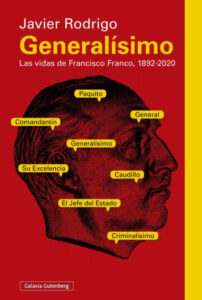Book Review: Franco’s Many Biographies
 Generalísimo. Las vidas de Francisco Franco, 1892-2020, by Javier Rodrigo. Barcelona, Galaxia Gutenberg, 2022. 494 pp.
Generalísimo. Las vidas de Francisco Franco, 1892-2020, by Javier Rodrigo. Barcelona, Galaxia Gutenberg, 2022. 494 pp.
The purpose of Javier Rodrigo’s “metabiography,” he states in the introduction, “is not to reconstruct the trajectory of the Caudillo’s life, but to show how it has been explained.” The assumption, in other words, is that Franco’s biographical project has come full circle.
Rodrigo’s decision to organize his book around eight of the nicknames Franco received over the course of this life—from “Paquito” to “Caudillo,” “Generalísimo,” and “Criminalísimo”—comes across as a bit superficial. Still, his overview of more than fifty biographies is certainly useful. He includes hagiographies like those of Arrarás (Franco’s first biographer), Galinsoga, De la Cierva, or Crozier; critical biographies like those by Fusi or Bachoud—one of the only two women biographers, although, strangely, Rodrigo omits the other one, Ashford-Hodges—and some of the best-known biographies such as Paul Preston’s magnum opus and the more recent, revisionist take by Stanley Payne and Jesús Palacios. Rodrigo also discusses books that, without being full-blown biographies, make important contributions to our knowledge of Franco’s life, such as those by Tusell, Cazorla, or Moradiellos.
Rodrigo’s close to 500-page tome includes its own detailed account of Franco’s life and afterlife, from his birth in El Ferrol in 1892 and his death in Madrid in 1975, to his exhumation from the Valley of the Fallen in 2019. Still, rather than a definitive biography in its own right, the book reads like a summary of the kind that ChatGPT might come up with. This prompts three observations:
First, Rodrigo’s book does not supersede the biographies he discusses. We cannot dismiss the pleasure that reading a well-constructed narrative of a life can provide, whether it’s apologetic (like De la Cierva’s or Crozier’s) or critical, like Preston’s. Biographies, after all, are a literary genre.
Second, Rodrigo glosses over an essential aspect of every biography: the relationship between the biographer and his or her subject, which often shapes the entire text. Each biographer approaches the figure of Franco from a different cultural, ideological, or historical perspective. Much like in a novel, there is a constant dialectic between narrator and character. A metabiography that captures this aspect of the genre much better is John Lukacs’ The Hitler of History (1997).
Third, the reader of a metabiography like this one expects the author to help distinguish between fact and myth. In Rodrigo’s book, however, the reader comes away with the impression that every single one of the previous biographers helped construct Franco’s myth, so that Rodrigo is left the task of writing the definitive, intensely documented account of Franco’s life. Here, too, it would have been more useful to follow Lukacs’ example and, instead of Rodrigo’s exhaustive approach, present a more conceptual analysis based on a smaller number of examples.
The good news is that the field is by no means sewn up yet—it’s far from atado y bien atado, as Franco assured the Spaniards his legacy was. Rather, the window remains open for more imaginative metabiographical projects to rival Rodrigo’s comprehensive, but ultimately cold, approach.
Jorge Zirulnik is a psychiatrist and amateur Hispanist. His main field of research is intellectual creativity, with a focus on thinkers and writers under totalitarian regimes. He lives and works in Buenos Aires, Argentina. Translation by Sebastiaan Faber.












